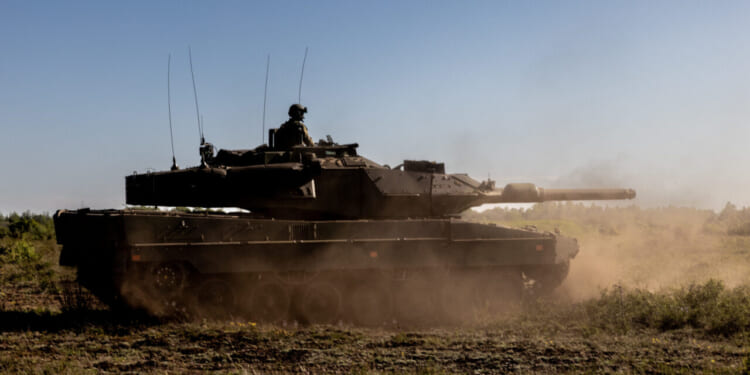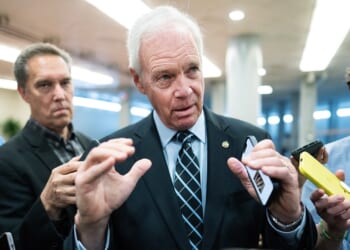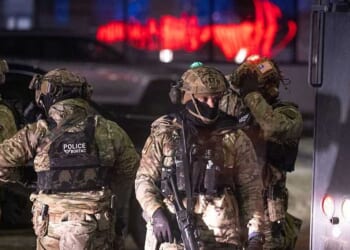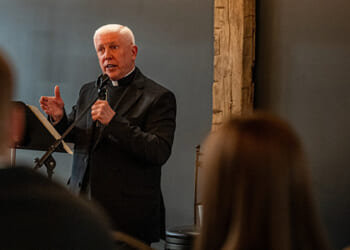Several senior Russian officials have gone on the record to warn that NATO is preparing for war.
Russia is accusing NATO of practicing a blockade of the country during recent large-scale exercises in the Baltic Sea, as well as preparing for a conflict with Russia.
Relations between Russia and NATO have deteriorated to an alarming degree following Moscow’s decision to launch a full-scale invasion of Ukraine nearly four years ago.
Russia Thinks NATO Is Becoming More Aggressive
Recently, several senior Russian officials have gone on the record to warn that NATO is preparing for war with Russia.
Russian deputy foreign minister Alexander Grushko accused NATO of preparing to blockade Russia through the Baltic Sea.
“During the alliance’s exercises, scenarios such as blocking the Kaliningrad region are being practiced. The [Baltic] region is undergoing active militarization, with an influx of coalition forces and resources,” the senior Russian official stated.
Kaliningrad is a Russian enclave between Lithuania and Poland. It offers Moscow a second gate to the Baltic Sea. The other point of access is to the north at St. Petersburg.
But the Russian deputy foreign minister was not the only senior Russian official to accuse NATO of preparing to strike.
Sergei Naryshkin, the head of SVR, the Russian foreign intelligence service, also accused NATO of preparing for military operations against Russia.
The chief of the SVR said that NATO is “rapidly mobilizing military resources and shaping public opinion to justify conflict.”
“The task has been set to rapidly equip NATO’s designated Allied Response Forces with all necessary resources,” Naryshkin added.
Russia’s head spy said that NATO and the European Union have embarked on a “multiple-fold increase in the production of military equipment,” and are also conducting active mobilization training.
Grushko’s and Naryshkin’s remarks are part of a broader set of accusations directed by Russian officials at NATO.
NATO and the European Union have indeed increased military spending and have engaged in more and larger military drills. But not without reason.
Causation
The Russian officials ignore key cause-and-effect considerations. NATO increased its spending and readiness in response to Russia’s full-scale invasion of Ukraine. Motivating countries to spend more on their defense is not easy. It is particularly difficult during peacetime and without an evident threat. It is even more difficult during troublesome economic times after a global pandemic like COVID-19. But Russia succeeded in uniting NATO and Europe with the threat of war and prompted them to invest more in their collective defense and military capabilities.
These senior Russian officials’ statements are quite concerning. The Kremlin has a history of preparing the way before engaging in military operations.
For example, before fully invading Ukraine on February 24, 2022, the Kremlin had repeatedly made its case that Ukraine is nominally part of Russia and that Russian-speaking people in Ukraine were suffering under Kyiv’s authoritarian control. It later became apparent that the Kremlin was preparing the ground to justify its “special military operation.” It could be doing the same again.
The Kremlin knows how to conduct psychological operations and how to shape the information environment in a way to justify its actions. Accusing NATO of warmongering could very well be the spark for more intense competition between Russia and the transatlantic military alliance.
About the Author: Stavros Atlamazoglou
Stavros Atlamazoglou is a seasoned defense journalist specializing in special operations and a Hellenic Army veteran (national service with the 575th Marine Battalion and Army HQ). He holds a BA from the Johns Hopkins University and an MA from the Johns Hopkins’ School of Advanced International Studies (SAIS). His work has been featured in Business Insider, Sandboxx, and SOFREP.
Image: DVIDS.

















